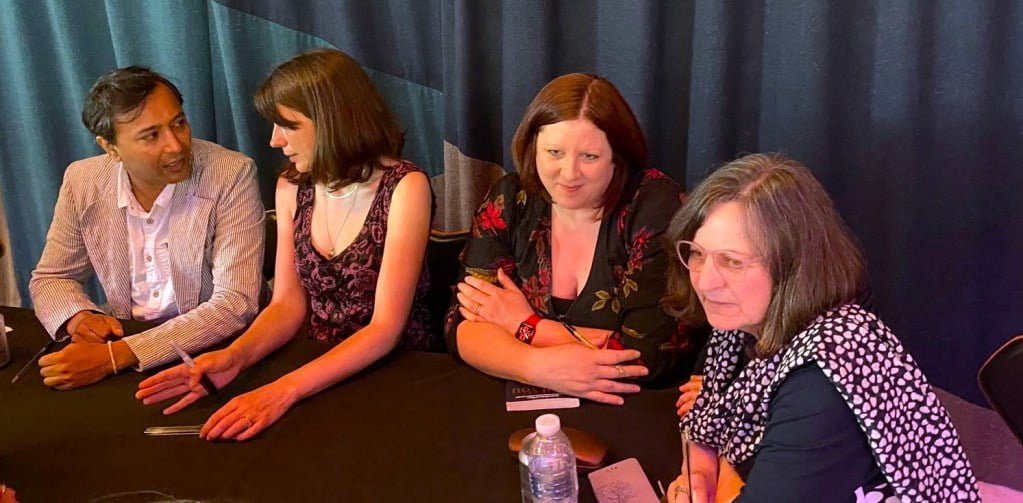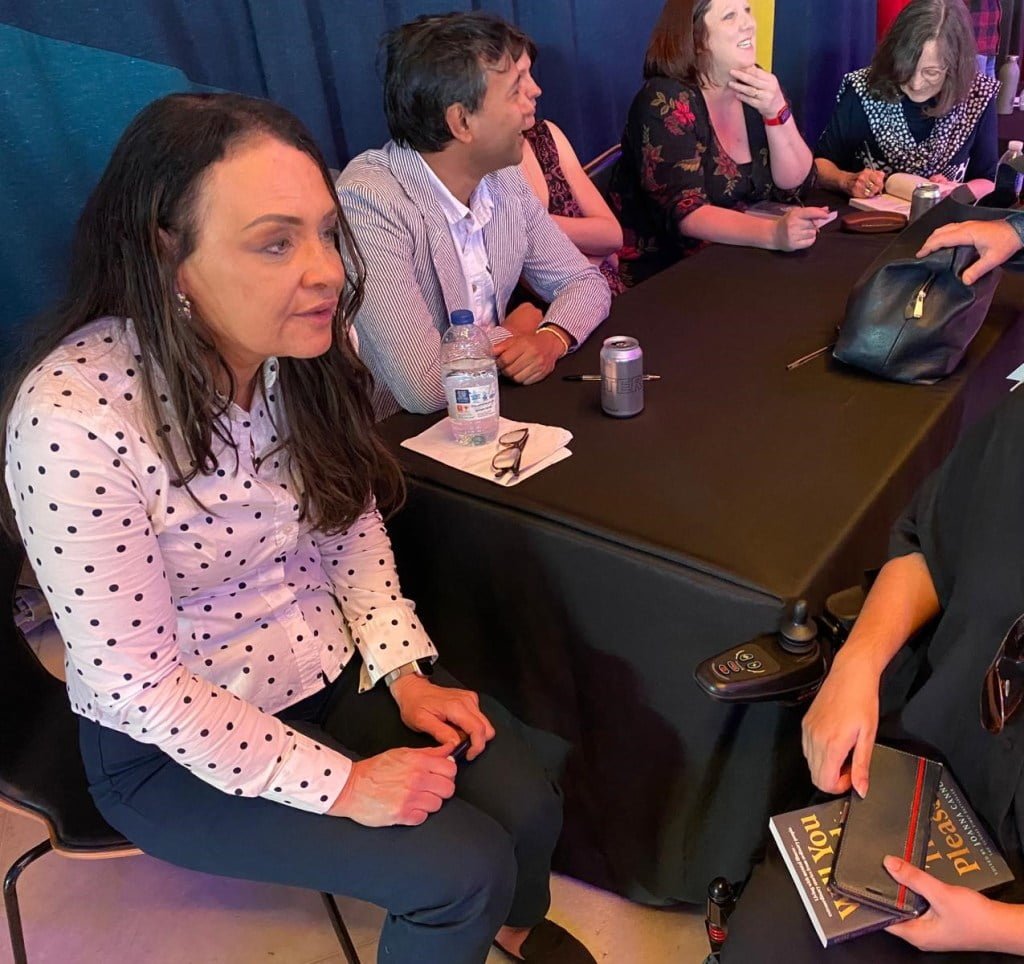“Writing is such a therapeutic process – telling stories is such a therapeutic process,” said Joanna Cannon during a special session at the Southbank Centre, London. The arts venue marked Mental Health Awareness Week as part of its Literature and Spoken Word Spring Season, showcasing a new anthology edited by the former psychiatrist-turned-author. The week, which took place from May 13 to May 19 this year, aims to raise awareness about various mental illnesses and health issues.

Cannon, who is no stranger to the field, hosted a panel of contributors to discuss the new book, “Will You Read This, Please?“, a collection of twelve real-life experiences that explore the varied dimensions of mental illness. Prominent writers from various walks of life collaborated with people who have firsthand experience with mental illness to co-author their stories. This partnership attempts to reduce stigma and foster understanding by sharing their lived experiences.
“Writing is a therapeutic process. We feel we’re going to be listened to if we write something down. It helps clarify things.”
Joanna Cannon
The therapeutic power of storytelling in mental health
Cannon, who wrote “The Trouble with Goats and Sheep,” stressed the importance of narrative in understanding mental health. “This event is all about mental health, mental illness, mental wellness and the importance of telling our stories,” Cannon explained. “Editing this collection has been a huge privilege because I got to read all of these stories,” “Three Things About Elsie” author shared, showcasing the profound impact of these personal accounts.
She added, “Writing is a therapeutic process. We feel we’re going to be listened to if we write something down. It helps clarify things.” She revealed the origin of the book’s title came from her days working in hospital wards, where patients would write letters to feel heard, illustrating the deep human need for expression and understanding.
Among the speakers was “With the End in Mind” author Kathryn Mannix, a retired palliative care doctor who now dedicates her time to improving public understanding of dying. Mannix, who we spoke to on the How To Be Books Podcast, shared her involvement in the book, specifically her contribution to a story about a violent crime linked to mental illness.
“I was particularly glad to work with Alain [Knight] to help him tell his story,” Mannix stated. “Mental illness gets a really bad rap because a very tiny number of people with serious mental illness cause harm to another person.” In one of the few stories of its kind in the book, Knight talks about an incident where he reportedly attacked a commuter after suffering a psychiatric breakdown and was subsequently sent to prison.
Listen: With The End in Mind author Dr Kathryn Mannix on death
Mannix explained that Alain “writes beautifully about being then in a secure unit, trying to help the newbies. So, you know, within a short period of time of being on the right medications, already this kindness, this wanting to help people is coming back out”.
She then discussed the ongoing journey of those who have battled mental illnesses and how sharing their stories aids in rehabilitation and societal reintegration. “It’s about seeing the links between things, the wisdom we’ve acquired, and helping others understand that it wasn’t them but their illness that influenced their past behaviours,” Mannix explained.
Actor and journalist Rhik Sammader then discussed his collaboration with a young man named Lewis, who dealt with a gambling addiction. The “I Never Said I Loved You” author spoke about the modern challenges of addiction that often go unnoticed, “It’s all online, it’s in video games. This is the main form of gambling for young people, and no one really knows that.” He pointed out the lack of adequate support services for new forms of addiction, which predominantly affect younger individuals.
The ongoing journey: recovery and reintegration in mental health
While Nicola Knight, a former journalist who suffered from postpartum psychosis, recounted her journey of recovery on the other side of the project. “Recovery does happen. It takes time and it can be a lifelong process, but it does happen,” Knight affirmed. Knight’s recovery journey led her to rediscover her passion for writing, culminating in her upcoming debut novel “The Night Before Christmas,” which is set for a September 2024 release. “I was so thrilled to be paired with Jenn [Ashworth]. I knew I could trust her with my story,” Knight shared, highlighting the therapeutic aspect of storytelling.
Feedback from readers has shown the significant impact of the book. “I’ve received messages from people who’ve said this book was the first to help them truly understand what their loved ones are experiencing,” shared Knight. “It’s about breaking the stigma and showing that recovery is possible, though it may be a lifelong journey.”
Listen: Bethanne Patrick on double depression amid January blues
Ashworth, who teaches creative writing at Lancaster University, spoke about her experience working with Knight and the complexities of translating personal suffering into written form. “It was a huge step for somebody to give their story to somebody else to be told,” Ashworth stated, acknowledging the deep sense of responsibility that comes with sharing someone else’s experiences. “A lot of our conversation was about how we would approach writing these stories,” Ashworth continued. “It was a delicate balance to maintain the authenticity of the experiences while crafting a narrative that resonates with readers.”
“When you’re telling someone else’s story, it feels like very live ammunition. You talk about someone’s deepest feelings and their relationships with people in their lives, their loved ones. It’s not your story, but it’s different from fiction because it’s also not something you’re creating. There’s a sort of pastoral element to it as well as a storytelling, narrativising things. So it’s quite interesting to try and juggle all of those things.”
Rhik Sammader
Ashworth, who as written a number of memoirs including “Notes Made While Falling“, added: “Writing it down helps you make sense of it, though it’s not always easy. It can be very difficult, especially when revisiting painful experiences”. She stressed the importance of resilience and the ongoing nature of recovery, which can often be a ‘bumpy ride.’
In the same vein, Sammader added that there is a kind of courage when it comes to expressing one’s vulnerabilities: “When you’re a storyteller or struggling mentally, it’s the same impulse—you want something to feel real because otherwise, you’re kind of a hostage”. However, he explained how telling someone else’s story is completely different than telling your own, as it often feels like handling “live ammunition”.
The potential of writing in mental health recovery
How To Be Books also asked the panel whether the process of peer support writing could benefit those within the mental health system. Across the UK, Recovery Colleges support people’s recovery from mental health difficulties through learning and education, co-produced by people with lived experience and professional expertise. Cannon responded, “It would be great to introduce those things.”

While she underlined the importance of not re-traumatising patients, she noted that creative writing already exists in prison settings, suggesting it could be incorporated into mental health settings as well. “It would be a great thing for a mental health board to have a buddy you can talk to, someone to whom you can tell your story without worrying about upsetting, offending, or frightening your close family and friends,” she said.
Cannon wrapped up the event by touching on the universal themes of ignominy and recovery that emerge from the stories. “There is a degree of shame in every single story for different reasons,” Cannon remarked, urging compassion and understanding as important responses to mental health challenges.
[…] Read: Will You Read This, Please? writers on mental health storytelling […]